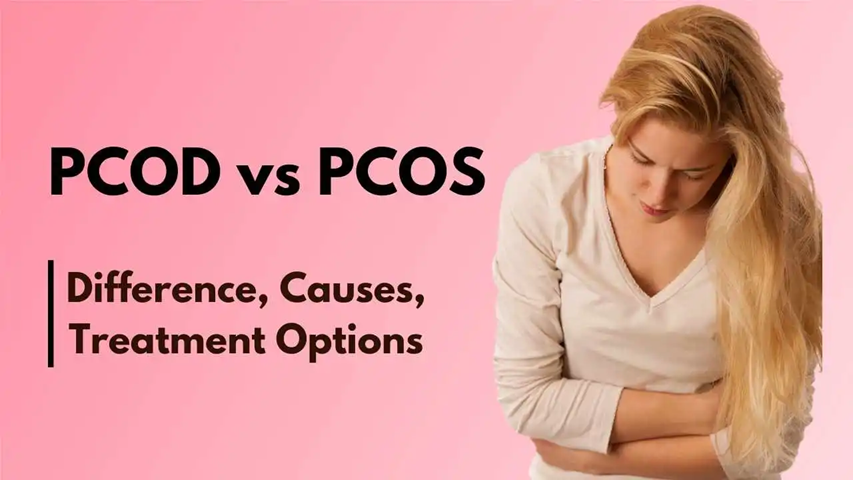
Polycystic Ovary Syndrome (PCOS) and Polycystic Ovarian Disease (PCOD) are two common hormonal disorders affecting women of reproductive age. While both conditions are related to ovarian health and can cause significant challenges, they have distinct characteristics. Understanding the differences, symptoms, causes, and effects of PCOS and PCOD is crucial for managing them effectively.
What is PCOS?
Polycystic Ovary Syndrome (PCOS) is a hormonal disorder where the ovaries produce an excess of androgens (male hormones). This imbalance leads to irregular ovulation, causing cysts in the ovaries and various metabolic issues. PCOS is often linked with insulin resistance, weight gain, and a higher risk of diabetes and cardiovascular diseases.
What is PCOD?
Polycystic Ovarian Disease (PCOD) is a condition where the ovaries release immature or partially mature eggs, which develop into cysts over time. This leads to hormonal imbalance and irregular menstrual cycles. Unlike PCOS, PCOD is generally less severe and can often be managed with lifestyle changes and diet modifications.
How PCOS and PCOD Affect Life
1. Irregular Menstrual Cycles
Women with PCOS or PCOD often experience delayed, irregular, or absent periods due to hormonal imbalance. This unpredictability can cause anxiety and difficulty in planning pregnancies.
2. Infertility Struggles
PCOS is one of the leading causes of infertility. Since ovulation is affected, conceiving becomes difficult, requiring medical intervention like fertility treatments, ovulation-inducing medications, or IVF.
3. Weight Gain and Obesity
Both conditions, especially PCOS, lead to unexplained weight gain. The excess fat, particularly around the abdomen, makes it harder to manage insulin levels and increases the risk of diabetes.
4. Acne and Skin Problems
High androgen levels can cause severe acne, oily skin, and pigmentation issues, leading to low self-esteem and confidence problems.
5. Hair Thinning and Excessive Hair Growth
Women with PCOS often experience hirsutism (excessive facial and body hair growth) along with scalp hair thinning, resembling male-pattern baldness. These changes can be distressing and impact mental health.
6. Mood Swings and Mental Health Issues
Hormonal fluctuations lead to anxiety, depression, and mood swings. The stress of managing weight, fertility, and appearance can further contribute to mental health struggles.
7. Increased Risk of Chronic Diseases
PCOS, in particular, is associated with diabetes, high blood pressure, and heart disease due to insulin resistance. If left untreated, it can lead to serious health complications in later life.
Treatment and Management of PCOS and PCOD
1. Lifestyle Modifications
- Healthy Diet: A low-carb, high-fiber diet with whole grains, fruits, vegetables, and lean proteins helps manage weight and blood sugar.
- Regular Exercise: Cardio and strength training improve insulin sensitivity and help regulate hormones.
- Weight Management: Losing 5-10% of body weight can significantly improve symptoms and restore ovulation.
2. Medications
- Birth Control Pills: Regulate periods and control acne and hair growth.
- Metformin: Helps with insulin resistance and weight management.
- Clomiphene & Letrozole: Used for inducing ovulation in women trying to conceive.
3. Medical Procedures
- Ovarian Drilling: A minor surgery to reduce androgen levels and restore ovulation.
- IVF (In-Vitro Fertilization): A common fertility treatment for women struggling to conceive due to PCOS.
4. Stress Management and Mental Health Care
- Yoga and Meditation: Helps balance hormones and reduce stress.
- Therapy and Support Groups: Managing mental health issues associated with PCOS and PCOD is crucial for overall well-being.
How a Gynecologist Helps in Managing PCOS and PCOD
Consulting a gynecologist is crucial for managing PCOS and PCOD effectively. The best gynaecologist in agra can help diagnose these conditions through a combination of physical examinations, blood tests, and ultrasound imaging. Early diagnosis plays a key role in preventing complications and improving overall health.
A gynecologist provides personalized treatment plans based on the severity of the condition. For women struggling with irregular periods, birth control pills or hormone-regulating medications can help restore menstrual regularity. If infertility is a concern, ovulation-inducing drugs such as Clomiphene or Letrozole may be prescribed to increase the chances of conception. In more severe cases, assisted reproductive techniques like IVF may be recommended.
Conclusion
PCOS and PCOD can significantly impact a woman’s physical, emotional, and reproductive health. However, with early diagnosis, lifestyle changes, and medical treatment, their effects can be managed effectively. Seeking medical advice and maintaining a healthy lifestyle are key to improving quality of life and overcoming the challenges these conditions bring.